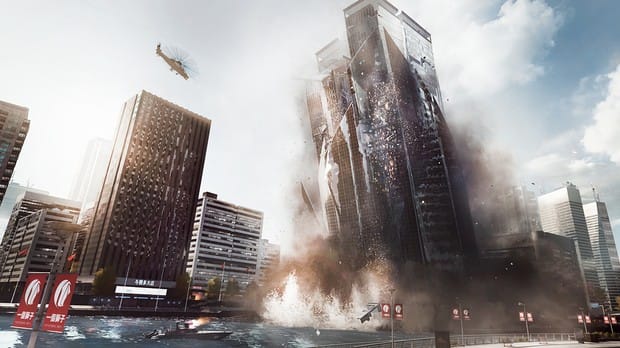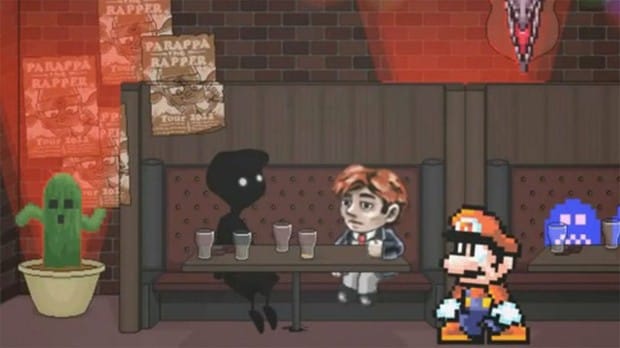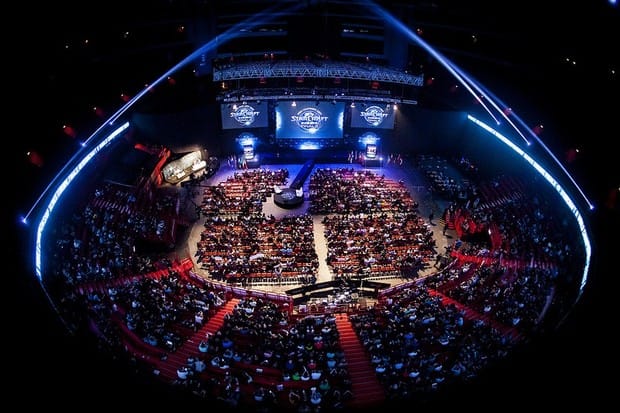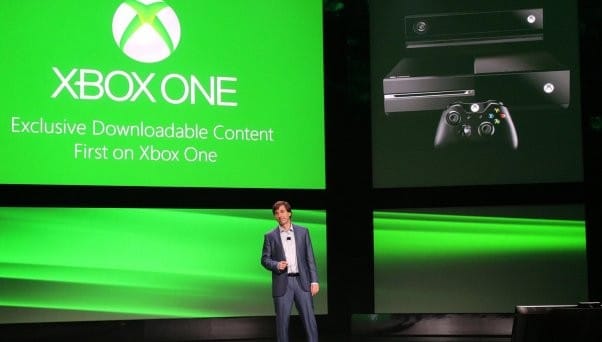The top 10 worst buzzwords of 2013

There is no category for “best videogame buzzword;” they’re all bad. Once a word becomes buzzworthy, it literally takes on the attributes of a mosquito, making an annoying sound in your ear while threatening to suck the life out of you and spread disease. The sad thing is, some of these words actually represent cool things, but through corporate co-option, misuse, or overuse they’re turned into shells of their former selves or lost meaning entirely. Others are just dumb.
10. Drivatar – Sounding like a pill you’d take for high cholesterol, Drivatar is a key feature in Forza 5 that tracks how you drive and builds AI from that data to race against your friends. If you drive like a jerk, your Drivatar will do the same in your stead. While this makes for fascinating technology, it changes the game from a racing simulation to a simulation of online videogames. That is, unless you’d have me believe a six-car pile-up on the first turn is “how the pros do it.”
9. Second Screen Experience – There is so much happening in new videogames that you need TWO screens to see it all. Little did you know that when you look at your phone during the boring sections of a game, you’re actually engaging with what’s called a Second Screen Experience. With this new technology at your disposal, you can squint at the world map on a small handheld screen instead of just pulling it up from the pause menu. It’s the most profound innovation since the Second Player Experience where you start on the right side of the screen instead of the left.

8. Levolution – I was disappointed to discover that Battlefield 4’s Levolution concept was merely a combination of “level” and “evolution,” and not the French word “l’evolution.” After all, what game wouldn’t be greatly improved with the addition of sexy accents and Daft Punk music? Alas, BF4 is content with wanton monumental destruction that alters the layout of the multiplayer map. Well, that is assuming that your game doesn’t crash first. Zut alors!
7. Always-On – This year, videogames became more non-stop than ever before. While game companies tout the convenience of being “always on” (always powered up, always online, always checking to make sure you’re not a pirate), the notion also introduces players to a newfound relentlessness. Gone are the days when people were encouraged to save energy by turning off their electronics when they aren’t using them. “Always-on” means your new console works like a refrigerator now: leave it running or else things will go bad.
6. Early Access – Ugh, release dates are so passé. Why bother waiting for games to be completed before purchasing and playing them when you can get the glitchy, broken version now and take on the role of “unpaid game tester?” With Early Access, you can start now! On the other hand, considering the ramshackle state in which many complete games ship, what difference does it make? For better or worse, Early Access is another step toward videogames as conceptual art: ideas for games are the new games. Thanks, Minecraft.

5. Indie – The problem with the term “indie” isn’t that there is no definition for it, it’s that there are too many definitions. Is an indie game one made by a small team? How small? Do all indies self-publish? Some have claimed that “indie” has more to do with a feeling of camaraderie in an inclusive development community. If Nintendo pulls a Focus Features and creates a small in-house indie studio, would the resulting games truly be “indie games?” What if one of them starred hipster facial hair aficionado, Waluigi? Yeah, that’s what I thought.
4. The Cloud – The Cloud isn’t exclusively a game term, but it wormed its way into videogames this year in a big way, thanks in large part to the Xbox One. The Cloud is a deceptive word that’s meant to make online storage and outsourced computations seem magical. On the Xbox One, Cloud storage is called the Skydrive, as if you send your Killer Instinct game save up to the stratosphere where it hangs out, awaiting your summoning call. But hey, maybe I’m just being cynical. I’m sure when you boot up the game, your Shadow Jago character data just flies in out of the blue, like a stork delivering a newborn. That’s how that works, right?

3. eSports – A lot of people like to debate whether videogames can be sports, but that lingering credibility isn’t why “eSports” is on this list. eSports is here because every game with competitive multiplayer is touted by their developers as a potential eSport. There’s a presumptive notion that a “scene” will develop around the game, and maybe, if they’re really lucky, the most dedicated players will forsake their families and social responsibilities and move to Korea to play the game for 14 hours a day. Also, the wannabe iPod intercaps aren’t doing it any favors.
2. Roguelike-like – This is a term that exists purely for the sake of avoiding the argument about whether a game is actually like Rogue. “Roguelike” itself is a true bottom-up buzzword used as a wide brush to paint everything from FTL to Tokyo Jungle to Demon’s Souls. “Roguelike-like” however is a hideous word, used by people who know better, but with the hope that the extra “like” tacked on will detract would-be scorners. If you want to expand the definition of Roguelike, by all means, keep using it to describe games outside of the term’s traditional guidelines. Otherwise, just be honest and say the game has randomized dungeons or permadeath; whichever is truer.

1. Content – The worst of the worst. I can’t believe so many smart, creative people use this term to describe their own work. You might as well just say “stuff” or “things” instead since “content” gives no indication as to what you’re actually talking about while also draining whatever it is of any personality or artistic merit it may actually possess. “We plan to release all new ‘stuff’ to download in the coming months.” “The PS4 version will have exclusive original ‘things.’” How depressing is it to have talented writers, artists, programmers, and designers put in years of effort to create a new gaming experience, only to have it be dryly referred to as “original content?” Come on, people, it’s the holidays; give yourself some credit.
Top Image via David Bruce
Mario Image via Dorkly



